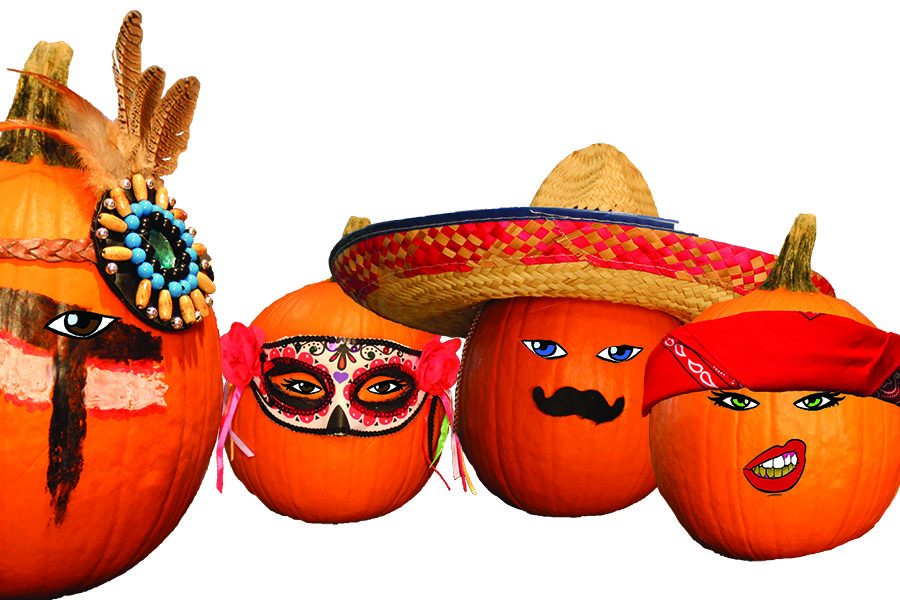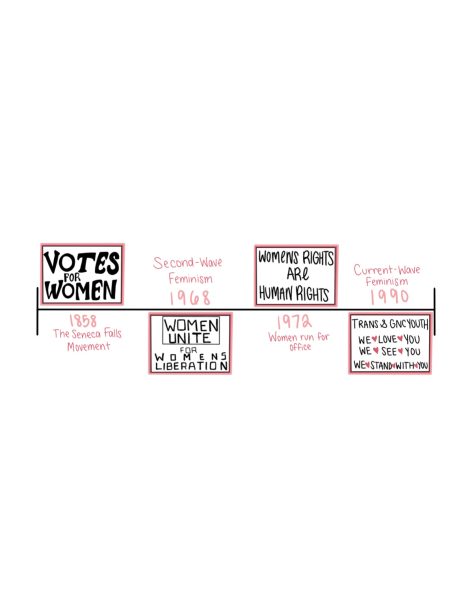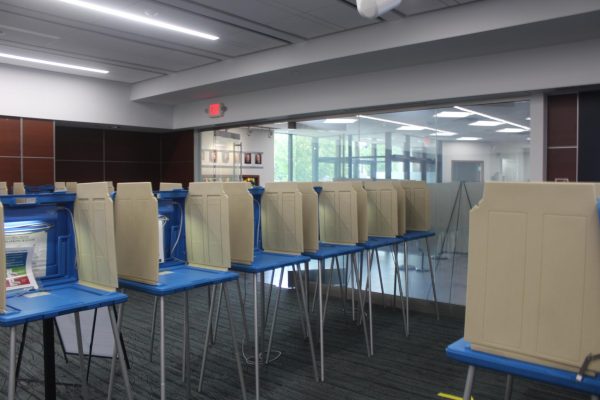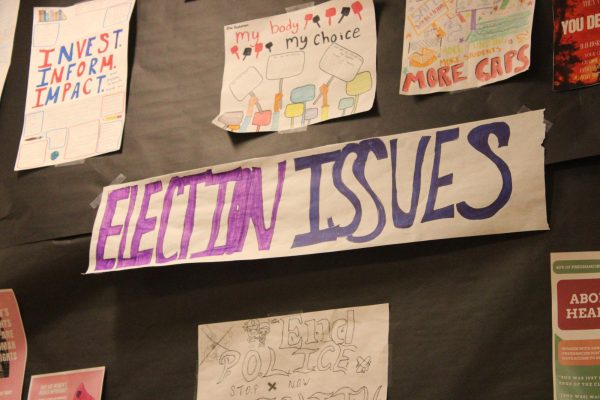Unmasking cultural appropriation
Halloween highlights larger issue of misrepresentation
As people step into their Halloween costumes this season, many don’t recognize the impact their costume may have.
Junior Zion Chappell said Halloween costumes have the potential to be offensive and seen as cultural appropriation because of their inherent lack of respect.
“I think there can be (cultural appropriation on Halloween) especially because a costume is supposed to be a silly thing that you put on,” Chappell said. “When you’re dressing up in a sombrero because it’s a silly hat rather than respecting that it is a part of a culture, I think that’s definitely cultural appropriation.”
Senior Ruchmah Borg said the appropriation of cultures lacks consideration for the struggles of marginalized groups.
“I think it’s (cultural appropriation) dangerous to ignore it because it dismisses the pain that people of color go through,” Borg said.
Lenora White, a human rights enforcement officer at the Minnesota Department of Human Rights, said she defines cultural appropriation as the misinterpretation of varying cultures.
“(Cultural appropriation is) mocking or misappropriating another person’s culture,” White said.
Equity coach Matt Horel said he defines cultural appropriation as a form of oppression that diminishes parts of a culture.
“(Appropriation occurs) when a dominant culture, white culture, takes aspects of marginalized culture and makes it their own,” Horel said.
Chappell said he views cultural appropriation as the utilization of another’s culture as an aesthetic, disregarding the significance of their customs.
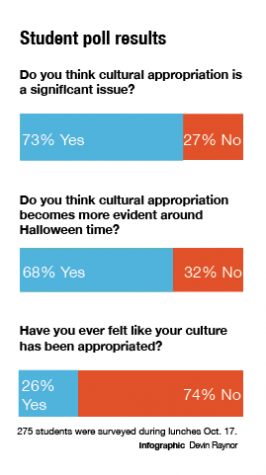 “(Cultural appropriation is) taking aspects of a culture without respecting where those (traditions) have come from,” Chappell said. “(In) a lot of very specific instances, it’s people trying to dress like a certain culture or talk like a certain culture so they feel cool.”
“(Cultural appropriation is) taking aspects of a culture without respecting where those (traditions) have come from,” Chappell said. “(In) a lot of very specific instances, it’s people trying to dress like a certain culture or talk like a certain culture so they feel cool.”
According to Ilana Turner, a doctoral student in the department of Gender, Women and Sexuality Studies at the University of Minnesota, cultural appropriation is rooted within American history.
“One thing that is key to understanding cultural appropriation is a lot of people think (cultural appropriation is) something that happens just today, but it’s actually part of a larger history of stealing land and labor though colonization,” Turner said.
Chappell said he feels cultural appropriation continues to surround society today apart from Halloween costumes.
“You can’t step outside your door without seeing some type of cultural appropriation on a daily basis,” Chappell said. “It’s a fact of life and a fact of how the world is progressing.”
Horel said cultural appropriation serves to further the divide between cultures, especially those in the minority.
“It’s just one more thing to minimize their experience or minimize their history and oppression,” Horel said.
Junior Ayanna Nathan said cultural appropriation directly affects Saint Louis Park because of the schools’ multicultural student population.
“Saint Louis Park has such a diverse community. We have large Jewish population, we have a large Muslim population, we have a significant Hispanic population. (Cultural appropriation) affects all of those groups in a negative way,” Nathan said.
White said it is her department’s job to get involved if a student feels their human rights are violated.
“Particularly in the area of education we are tasked to create discrimination-free environments,” White said. “If you’re in your school and the school is allowing racially offensive or religiously offensive costumes to be worn, and a student complains about it, that could prompt a charge of discrimination.”
Beth El Synagogue’s senior Rabbi Alexander Davis said it is up to the St. Louis Park community to be watchful for appropriation.
“While it is a time of revelry and happiness and joy, it can not come at the expense of another person,” Davis said. “It is incumbent upon us as good neighbors to think carefully of how we celebrate.”
Junior Melissa Alcantar said appropriating often creates conflict within in the community.
“I think it affects our community because people cause a lot of tension between cultures when they appropriate other cultures,” Alcantar said. “Instead of uniting people you have people who are mad at one another.”
Turner said certain costumes can turn aspects of a person’s culture into an object.
“Halloween gives a forum for that type of racism to be expressed, so it’s probably extra important to remember that when you’re dressing up you’re objectifying something. You’re making it into an object that has very little dimension,” Turner said.
Spanish teacher Kris Christiansen said she remembers growing up seeing similar Halloween costume trends that were just as offensive as the ones seen today.
“When I was a kid in particular, there was dressing up like (Native Americans). (The costumes were) very common and very normal Halloween costumes. If it wasn’t cultural appropriation then it was almost mocking,” Christensen said.
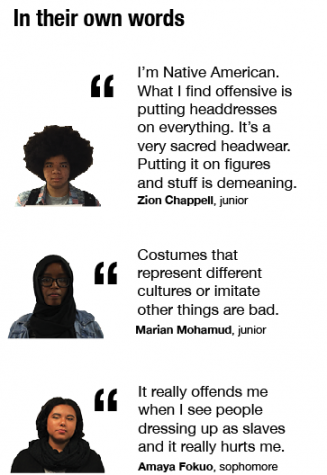 Nathan said she feels the best way to combat cultural appropriation is to educate people about different cultures and the harm appropriation can cause.
Nathan said she feels the best way to combat cultural appropriation is to educate people about different cultures and the harm appropriation can cause.
“I think the answer to every problem is education,” Nathan said. “We need to properly be educating everyone on what is okay and what is not okay, culturally, physically, and emotionally. We need to be educating people to bring awareness to the issue.”
Alcantar said she feels there is a distinction between appreciation and appropriation of a culture.
“People fail to realize that they need to respect other people’s cultures and stay in their lanes,” Alcantar said. “If they want to be appreciative of a culture, do it in a correct way and not act like it’s a costume or something to make fun of.”
Horel said he believes addressing problems and facing them directly will help solve the overall issue of cultural appropriation.
“For (equity coaches), we bring to light what (cultural appropriation) looks like,” Horel said. “When we take cultures from oppressed people and try and make it our own or try and make it cute, it’s not okay.”
White said she encourages students everywhere to be open to the lives and identities of others and seek to learn about other cultures.
“(Students should) educate themselves and listen to other people. Hopefully you have people around you who have friends of different cultures. Just listen to them,” White said. “If you have a question or you’re wondering ‘is this costume appropriate,’ just ask someone.”
According to Turner, students can make the decision to not engage in cultural appropriation during Halloween.
“We can’t change (history), but there are some things we have choices about,” Turner said. “We have the choice whether or not to extend or expand or participate in. Cultural appropriation is one of those things. If we want to heal these really violent histories of slavery and colonization, one of those things we can decide to do is not engage in cultural appropriation.”
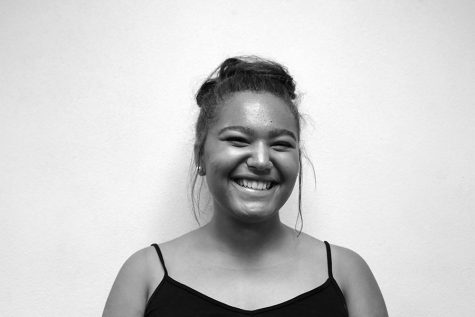
Hey guys Alexis here! I love informing people about whats going on in the world, so here I am! I enjoy long walks on the beach, learning new things, karate...
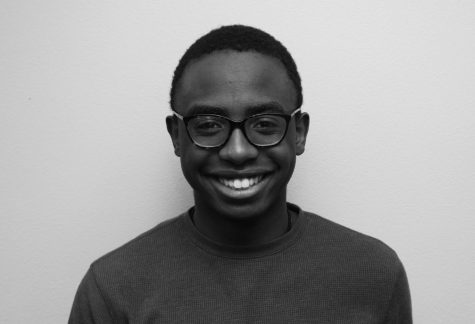
Hi I’m Ndunzi/Jason and I am the champion. When I’m the center of attention everyone gets a sheer heart attack so don’t stop me now. I’m a nice...



